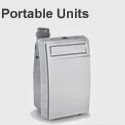While there are many different types and sizes to choose from, not all air conditioners are created equal. As you shop for your new air conditioner consider the following:
• Where and how the air conditioner will be installed or used?
• How large is the room where you plan to install your new unit?
• What special feature options are most beneficial to you?
• Will you be installing your new air conditioner by yourself or will you have help?
Window units are by far the most popular. Models can be installed in most single or double-hung windows and typically come with accordion panels that allow for a secure fit. Some models can fit in sliding windows. They do require a support of some kind, such as a wooden plank or a specially designed shelf that can be attached to the exterior of your home for dedicated reinforcement.
Installing a window unit is an easy DIY project. Make sure you measure the inside window dimensions before you shop.
Advantages and Disadvantages
• Easy to install
• Easy to remove and store
• Affordable
• Heating and cooling units available
• Blocks window where installed
Portable air conditioners or freestanding units can be used to cool a specific area in a home such as a bedroom. They don't require any permanent installation and instead have a standard window venting kit for the exhaust hose. Many portable units are mounted on casters so you can move them freely from room to room. They come with a large, flexible hose that is attached to a window for exhausting hot air, much like a clothes dryer is vented.
Most portable units have reservoirs that need to be periodically emptied, though some also come with optional hookups for a drainage hose. Some new models evaporate much of the moisture and exhaust it, greatly reducing the frequency of need to empty a container. Portable air conditioners can also be used to support any central HVAC (Heating, Ventilating, Air Conditioning) systems.
When choosing the right portable air conditioner be sure to measure the room size (length x width), match the room size with the BTU and check electrical requirements.
Advantages and Disadvantages
• Easy to set up or relocate• Can use in multiple rooms
• Heavy-weight
• Less efficient
Built-in air conditioners can be installed in your wall for permanent placement and operation. These units often provide both cold and hot air operation for more versatile use. They are a great solution for rooms or additions to your house that may not be connected to the central heating and air conditioning system.
Wall units require opening a hole in an exterior wall. They don’t take up window space, and they allow for a more airtight and secure fit. Many window models can be installed through the wall, just add a frame to support the unit. Smaller units can be installed by handy do-it-yourselfers. Larger wall units may require professional installation.
Advantages and Disadvantages
• Permanent
• Models with heat function available
• Location flexibility
• Option to use wireless thermostat
• More expensive
• More involved installation
• Additional parts may be required





没有评论:
发表评论